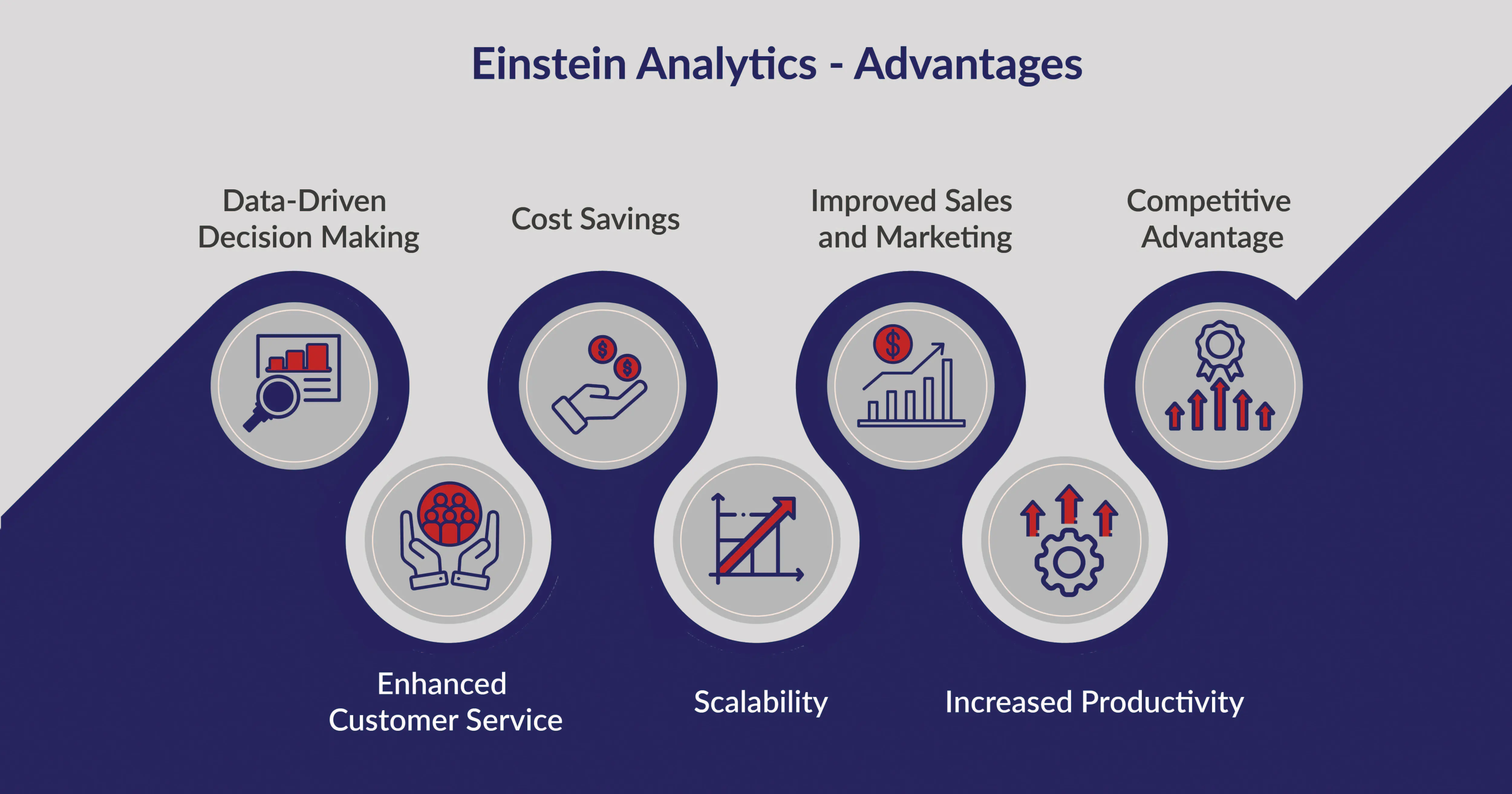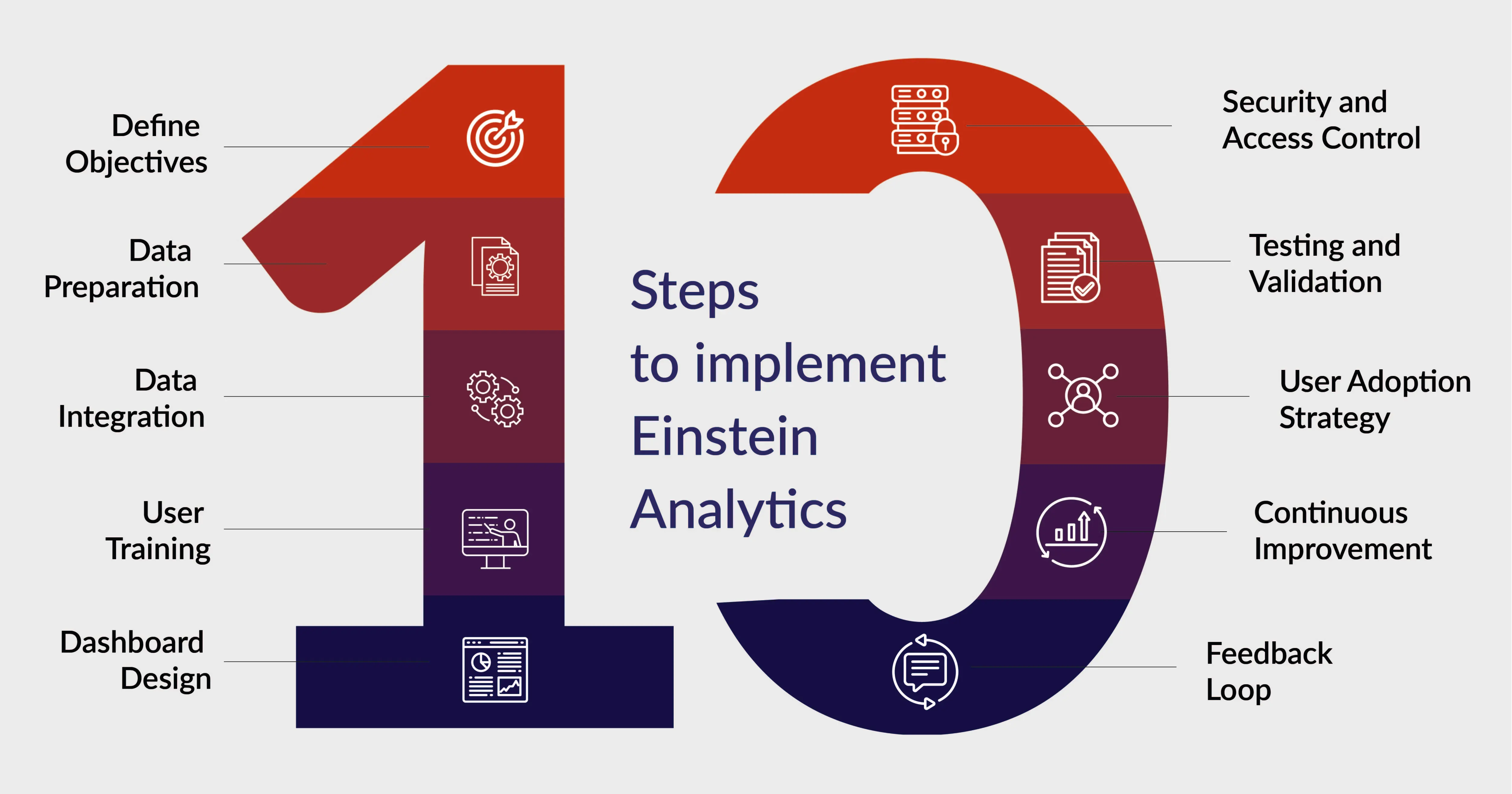Using Einstein Analytics- Leveraging AI for Data Insights in Salesforce

In today's data-driven business landscape, making informed decisions is critical for success. Companies collect vast amounts of data from various sources, but the challenge lies in transforming this data into actionable insights.
Salesforce, a leading customer relationship management (CRM) platform, has recognized this need and introduced Einstein Analytics, an advanced analytics tool that leverages the power of artificial intelligence (AI) to unlock valuable insights from your data. In this blog post, we will delve into Einstein Analytics, exploring its features, benefits, and how it can empower organizations to make data-driven decisions.
Einstein Analytics is an AI-powered analytics platform developed by Salesforce, designed to help organizations analyze data from multiple sources, including Salesforce itself, to gain deeper insights into their business operations. It brings together data from various departments, such as sales, marketing, service, and more, to provide a unified view of an organization's performance. Here's a closer look at some of its key features:
Data Integration
Einstein Analytics seamlessly connects to various data sources, including Salesforce data, external databases, spreadsheets, and more. This integration allows organizations to consolidate all their data in one place, making it easier to analyze and derive insights.
AI-Driven Insights
At the core of Einstein Analytics is AI, which uses machine learning algorithms to automatically identify trends, patterns, and anomalies in your data. This capability enables users to discover insights that might be missed with traditional analytics tools.
Customizable Dashboards
Users can create custom dashboards and reports tailored to their specific needs. The drag-and-drop interface makes it easy to design visually appealing and interactive dashboards without the need for coding.
Predictive Analytics
Einstein Analytics can predict future trends and outcomes based on historical data. This predictive capability empowers organizations to make proactive decisions, such as forecasting sales or predicting customer churn.
Natural Language Processing (NLP)
The platform supports NLP, enabling users to ask questions about their data in plain language. This feature makes data exploration accessible to users of all technical backgrounds.
Mobile Accessibility
Einstein Analytics is accessible on mobile devices, allowing users to access critical insights on the go. This mobile capability is particularly valuable for sales teams and field service personnel.
Security and Compliance
Salesforce has robust security measures in place to protect your data. Einstein Analytics inherits these security features, ensuring that your data remains confidential and compliant with relevant regulations.
Benefits of Using Einstein Analytics
Now that we have a good understanding of what Einstein Analytics is and its key features, let's explore the benefits it offers to organizations:

Data-Driven Decision Making
Data-driven decision making is pivotal for 21st-century success. Traditionally, decisions relied on intuition and experience, but Einstein Analytics has ushered in a new era. Organizations now leverage real-time data, resulting in objective, rational, and accurate choices, devoid of subjective biases.
This data-driven approach offers agility in responding to rapidly changing business landscapes. Continuous monitoring of key metrics and AI-driven alerts enable swift adaptations. Additionally, it fosters accountability through transparent decision-making, enhancing trust among team members and stakeholders. The iterative nature of data-driven decisions also promotes constant improvement, ideal for industries with complex, ever-evolving success factors.
Improved Sales and Marketing
Einstein Analytics is a game-changer for sales and marketing teams, equipping them with powerful tools and insights. Sales teams benefit from predictive analytics, enabling the identification of high-potential leads based on historical data. This optimization of resource allocation focuses efforts where they matter most, improving conversion rates.
For marketing, Einstein Analytics fine-tunes campaigns by analyzing past successes and failures. This data-driven approach ensures marketing budgets are wisely invested, delivering optimal results. Real-time campaign monitoring enables agile adjustments in a swiftly changing digital landscape. In summary, Einstein Analytics enhances sales and marketing efforts, boosting conversions, revenue, and resource efficiency.
Enhanced Customer Service
Einstein Analytics elevates customer service by providing service teams with a holistic view of customer data. This comprehensive history of interactions enables support agents to offer personalized and efficient assistance, enhancing the overall customer experience. Additionally, the platform's predictive capabilities help preempt potential service issues, allowing organizations to address problems proactively.
Moreover, Einstein Analytics empowers service teams to track and improve key performance metrics in real-time, including response times and customer satisfaction scores. This data-driven approach results in increased customer satisfaction, cost savings in service delivery, and a more loyal customer base.
Increased Productivity
Einstein Analytics drives productivity with its user-friendly interface that caters to diverse skill levels. Employees without technical backgrounds can effortlessly create custom dashboards and reports, democratizing data access and analysis. This reduces reliance on dedicated data analysts and empowers individuals to independently access and interpret data.
Furthermore, the platform's automation capabilities save valuable time by autonomously processing and analyzing data using machine learning algorithms. This liberates employees from manual data sifting, freeing them to focus on strategic tasks and informed decision-making. Additionally, the mobile accessibility of Einstein Analytics empowers sales teams and field personnel to access critical insights on the go, enabling data-driven decisions beyond the confines of their desks. In essence, Einstein Analytics enhances productivity through user-friendly interfaces, automation, and mobile empowerment, optimizing how employees utilize their time.
Cost Savings
Einstein Analytics drives cost savings through a multifaceted approach. Firstly, it optimizes operations, such as streamlining production processes and inventory management in manufacturing or smart staff scheduling in the service industry, thus reducing unnecessary costs. Secondly, in marketing, it enhances efficiency by enabling targeted campaigns aimed at high-potential prospects, lowering customer acquisition expenses compared to broad marketing efforts.
Moreover, the platform identifies areas of inefficiency and waste, facilitating the implementation of cost-saving measures. These measures encompass energy conservation, supply chain optimization, and supplier contract renegotiation, all guided by data-driven insights. In essence, Einstein Analytics contributes to cost savings by improving operations, marketing precision, and the identification and mitigation of inefficiencies across the business spectrum.
Competitive Advantage
Einstein Analytics empowers organizations to gain a competitive edge in a cutthroat business environment. Firstly, it facilitates data-driven decisions, allowing swift adaptation to market changes and a proactive approach to opportunities and challenges. Secondly, predictive analytics anticipates trends and customer behavior, enhancing responsiveness and customer-centricity.
Furthermore, data-driven insights fuel innovation by identifying areas for improvement and the development of products and services aligned with customer needs. Additionally, this approach deepens customer understanding, enabling personalized experiences that cultivate loyalty and advocacy. Satisfied customers are more likely to remain loyal and refer others, providing a substantial competitive advantage. In essence, Einstein Analytics equips organizations to excel through data-driven decisions, trend anticipation, innovation, and exceptional customer engagement.
Scalability
Einstein Analytics offers invaluable scalability for growing organizations. It effortlessly accommodates expanding data volumes and complexity, ensuring continued data-driven decision-making. Whether integrating more data sources or expanding customer bases, the platform remains a reliable tool, adapting seamlessly without performance compromises.
Furthermore, as businesses diversify geographically or introduce new products and services, Einstein Analytics offers the flexibility to create tailored dashboards and reports. This granularity enhances analysis and decision-making precision, even in multifaceted organizations. In essence, Einstein Analytics scales effortlessly to meet evolving business requirements, making it an asset for growing enterprises.
Einstein Analytics Solutions by Bolt Today
Use Cases of Einstein Analytics
Einstein Analytics is versatile and can be applied to various business scenarios. Here are some common use cases:
Sales Performance Analysis:
Sales teams can use Einstein Analytics to track sales performance, identify top-performing products or regions, and predict future sales trends. This information helps in optimizing sales strategies.Customer Churn Prediction:
By analyzing historical data, organizations can predict which customers are likely to churn and take proactive steps to retain them, such as offering personalized discounts or support.Marketing Campaign Optimization:
Marketers can use the platform to analyze the success of marketing campaigns, understand customer preferences, and tailor future campaigns for better results.Service Case Resolution:
Service teams can prioritize service cases based on their complexity and customer importance, ensuring that critical issues are addressed promptly.Inventory Management:
For businesses that deal with physical products, Einstein Analytics can help manage inventory levels more efficiently, reducing excess stock and associated costs.Financial Forecasting:
Finance departments can use the platform for financial forecasting, budget planning, and expense analysis.Healthcare Analytics:
In the healthcare industry, Einstein Analytics can be used to analyze patient data, optimize resource allocation, and improve patient care.Education Analytics:
Educational institutions can use the platform to track student performance, identify areas for improvement, and optimize course offerings.
Implementation and Adoption
Implementing Einstein Analytics requires a well-thought-out strategy to ensure its successful adoption within an organization. Here are some key steps to consider:

Define Objectives
Before implementing Einstein Analytics, it's crucial to clearly define your organization's goals and objectives for using the platform. What specific problems are you trying to solve, and what insights do you hope to gain? Understanding your objectives provides a clear roadmap for implementation.
Data Preparation
Data quality is paramount for successful analytics. Ensure that your data is clean, accurate, and well-organized. You may need to perform data cleaning, transformation, and integration to create a unified dataset that can be analyzed effectively.
Data Integration
Einstein Analytics can integrate data from various sources, including Salesforce, external databases, and third-party applications. Set up data connectors to ensure that all relevant data is accessible within the platform.
User Training
Provide training to users who will be working with Einstein Analytics. This includes administrators, data analysts, business analysts, and other stakeholders. Training should cover platform navigation, dashboard creation, and data analysis techniques.
Dashboard Design
Design customized dashboards that align with your organization's objectives. Dashboards should be user-friendly, visually appealing, and focused on delivering actionable insights. Consider the needs of different user groups and create dashboards tailored to their roles.
Security and Access Control
Implement robust security measures to protect sensitive data. Define access controls and permissions to ensure that users can only access the data and features relevant to their roles. Security is a critical aspect of data analytics, especially when dealing with sensitive customer data.
Testing and Validation
Before deploying Einstein Analytics in a production environment, thoroughly test the platform to ensure that it works as expected. Validate the accuracy of predictive models and the reliability of data integrations. Address any issues or discrepancies discovered during testing.
User Adoption Strategy
Promote user adoption by communicating the benefits of Einstein Analytics to your organization. Create user guides, conduct training sessions, and encourage users to explore the platform and its capabilities. User adoption is essential for realizing the full potential of the platform.
Continuous Improvement
Analytics is an ongoing process. Continuously monitor the performance of your analytics initiatives and seek opportunities for improvement. This includes refining predictive models, updating dashboards, and adapting to changing business needs.
Feedback Loop
Establish a feedback loop with users to gather insights on their experiences with Einstein Analytics. Use their feedback to make adjustments and enhancements to the platform to better meet their needs.
Challenges and Considerations
While Einstein Analytics offers numerous benefits, organizations should also be aware of potential challenges and considerations:
Data Privacy and Compliance:
Ensure that you are handling sensitive data in compliance with data protection regulations such as GDPR or HIPAA.Data Integration Complexity :
Integrating data from various sources can be complex and may require expertise in data engineering.Resource Allocation:
Implementing and maintaining Einstein Analytics may require dedicated resources, both in terms of personnel and infrastructure.Change Management:
Users may resist adopting new technologies or changing their existing workflows. Effective change management is crucial for successful adoption.Costs:
While Einstein Analytics can provide a significant return on investment, organizations should be aware of the licensing and implementation costs associated with the platform.
Conclusion
Einstein Analytics is a powerful tool that empowers organizations to harness the capabilities of AI for data insights within the Salesforce ecosystem. We explored its key features, use cases, implementation best practices, and real-world success stories. As the world of data analytics continues to evolve, Einstein Analytics is poised to play a crucial role in helping businesses make data-driven decisions, drive innovation, and achieve success in an increasingly competitive landscape.
Whether you're in sales, marketing, customer service, finance, or any other industry, Einstein Analytics has the potential to transform the way you analyze and leverage your data.
So, if you're ready to unlock the full potential of your data, it's time to start exploring Einstein Analytics and embark on your journey towards smarter, data-driven decision-making. Visit our website and book your consultation today, to know more about this amazing Salesforce tool!